In a dramatic turn of events that has sent shockwaves through both the tech and political spheres, the once-close alliance between U.S. President Donald Trump and tech billionaire Elon Musk has imploded into a publicfeud, threatening billions in government contracts and shaking industries from electric vehicles to spaceexploration. The fallout, centered around Trump’s controversial “Big Beautiful Bill,” has not only exposedideological rifts but also raised critical questions about the intersection of technology, policy, and personalinfluence in shaping America’s future. Here’s a deep dive into what happened, why it matters, and how it could impact the tech landscape.
The Spark: A Bill and a Billionaire’s Discontent
The rift began when Musk, who until recently served as a special advisor to Trump’s administration, publicly criticized the president’s signature tax and spending legislation, dubbed the “Big Beautiful Bill.” The bill, which passed the House before Memorial Day 2025 and is now under Senate scrutiny, aims to advance Trump’s domestic priorities but has drawn ire for its projected $2.4 trillion increase in the U.S. budget deficit over the next decade, according to the Congressional Budget Office.
Musk, known for his outspoken nature, didn’t hold back. In a series of posts on X on June 3, 2025, he labeled the bill a “disgusting abomination” and “outrageous, pork-filled,” arguing it undermines efforts to curb federal spending—a mission he championed during his 129-day stint leading the Department of Government Efficiency (DOGE). Musk’s criticisms escalated, urging Americans to pressure their representatives to “kill the bill,” even invoking imagery from Quentin Tarantino’s Kill Bill to rally his followers.
Trump, initially taking the high road, expressed disappointment during a June 5 Oval Office meeting with German Chancellor Friedrich Merz, claiming Musk “knew every aspect of this bill” and had no issues until after leaving his advisory role. However, the president’s restraint didn’t last. The feud exploded into a full-blown social media war, with Trump accusing Musk of ingratitude and threatening to terminate billions in federal subsidies and contracts for Musk’s companies, Tesla and SpaceX. Musk fired back, claiming Trump would not have won the 2024 election without his support and even alleging—without evidence—that Trump’s name appears in Jeffrey Epstein’s files, a provocative jab that intensified the personal nature of the conflict.
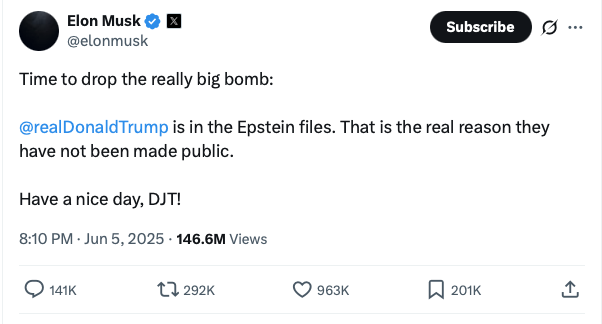
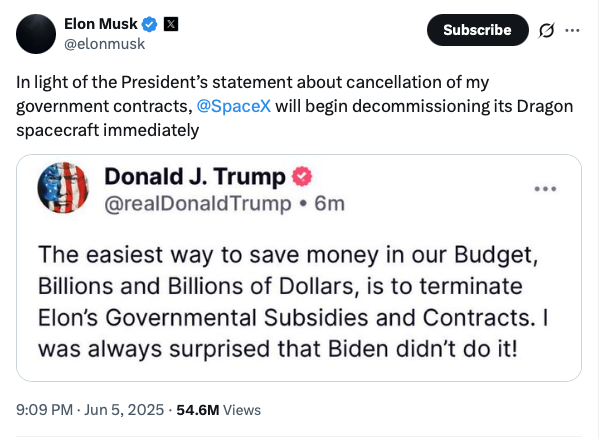
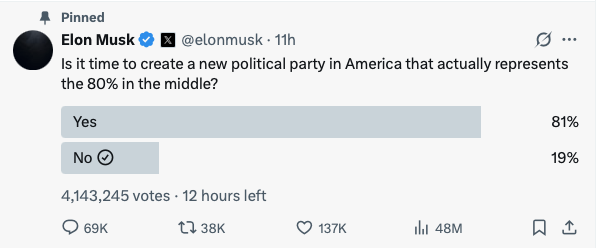
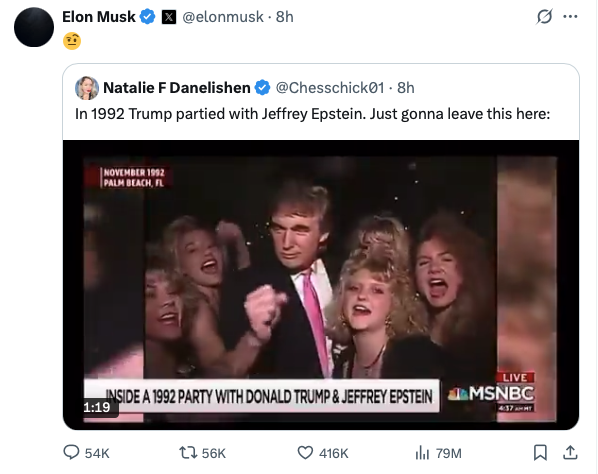
The Stakes: SpaceX, Tesla, and the Tech Industry
The fallout has immediate and far-reaching implications for Musk’s tech empire. SpaceX, a linchpin of U.S. space programs, holds approximately $22 billion in government contracts, including a $5 billion deal for its Dragon spacecraft, the only U.S. vessel capable of ferrying astronauts to and from the International Space Station (ISS). In a now-retracted threat, Musk announced on June 5 that SpaceX would begin decommissioning the Dragon spacecraft in response to Trump’s contract threats, a move that could jeopardize NASA’s operations and the future of the aging ISS. While Musk later signaled a willingness to cool tensions, the episode underscores SpaceX’s critical role in American space ambitions and the risks of politicizing its contracts.
Tesla, meanwhile, saw its stock plummet 14.2% on June 5, erasing roughly $152 billion in market value and knocking $8.73 billion off Musk’s personal net worth, according to the Bloomberg Billionaires Index. The drop reflects investor fears of a tougher regulatory environment, particularly as Trump suggested cutting electric vehicle (EV) subsidies, which Tesla has indirectly benefited from to the tune of $11.4 billion in regulatory credits. Musk, however, has claimed that ending EV credits would hurt Tesla’s rivals more, given its market dominance. Still, the uncertainty has rattled investors, with some analysts warning of broader implications for the EV sector if federal support wanes.
The Bigger Picture: Tech, Politics, and Power
The Trump-Musk feud is more than a personal spat; it’s a clash of titans that highlights the growing influence of tech moguls in shaping political and economic landscapes. Musk’s $250 million contribution to Trump’s 2024 campaign and his high-profile role in the administration underscored his political clout, but his abrupt departure from DOGE and subsequent attacks on Trump’s policies reveal the limits of their alliance. Posts on X reflect the public’s fascination with this drama, with some users noting earlier signs of tension, such as Trump’s frustration with Musk’s omnipresence during the transition period and Musk’s criticism of a $500 billion AI initiative.
For the tech industry, the fallout raises critical questions. Can a company like SpaceX, deeply entwined with government contracts, withstand political retribution? Will Tesla’s growth trajectory falter if EV incentives are slashed? And how will Musk’s X platform, where much of this feud has unfolded, shape public perception of the conflict? The answers could redefine the relationship between tech innovation and government policy.
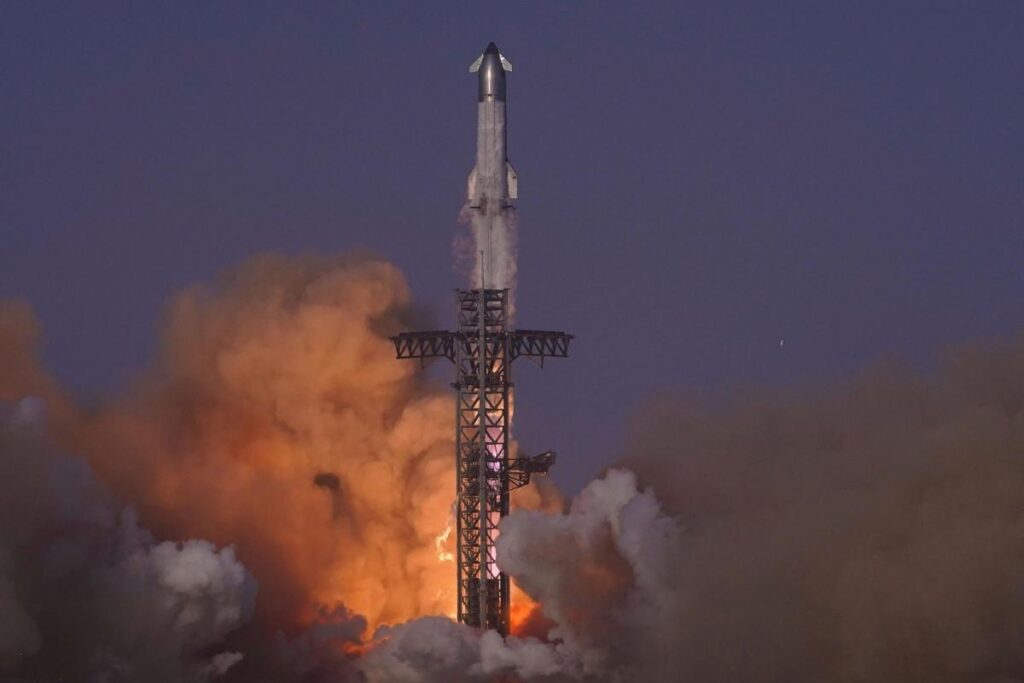
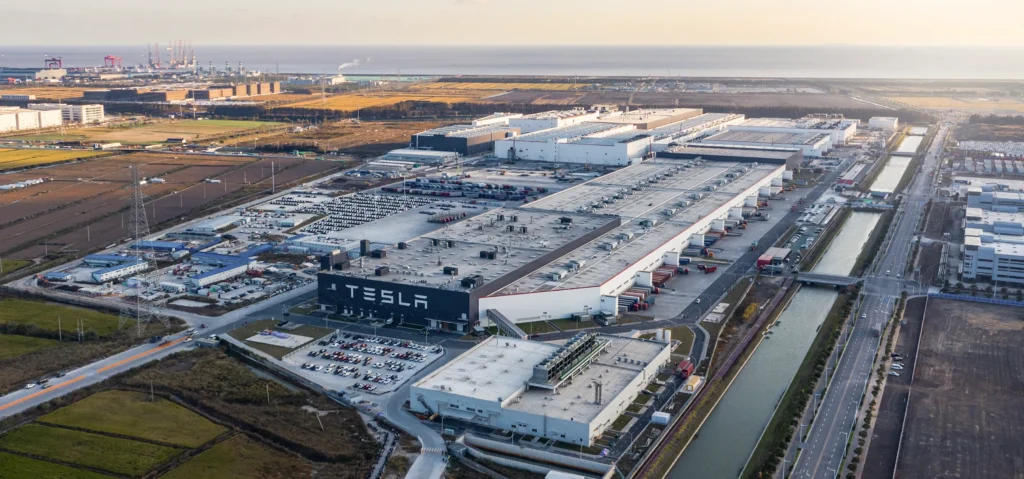
What’s Next?
As of June 6, 2025, Musk has hinted at a “cooling-off period,” but the damage may already be done. Republican lawmakers, caught between loyalty to Trump and Musk’s financial and ideological influence, face a delicate balancing act, with some like Senators Rand Paul and Ron Johnson echoing Musk’s concerns about the bill’s fiscal impact. Meanwhile, the Senate’s upcoming vote on the “Big Beautiful Bill” will test whether Musk’s campaign against it gains traction or if Trump’s political machine prevails.
For Indian tech enthusiasts and investors watching from afar, this saga offers lessons in the volatility of tech-political alliances. India’s own space and EV sectors, with players like ISRO and Tata Motors, operate in a different political context, but the Musk-Trump fallout underscores the risks of tying innovation to political whims. As Musk himself tweeted on X, “Bankrupting America is NOT ok!” Yet, the question remains: can he steer the narrative without burning bridges that his companies—and the tech industry—rely on?
Stay tuned to TechScoopIndia for updates on this unfolding drama and its ripple effects across the global tech landscape.


















